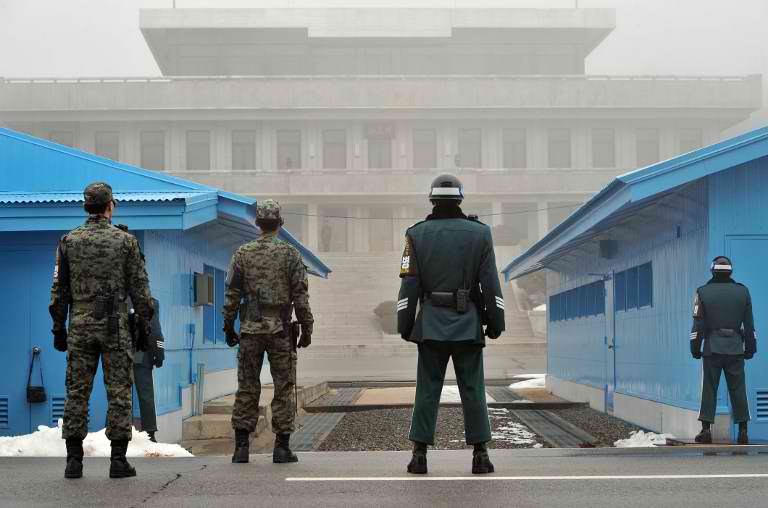SUMMARY
This is AI generated summarization, which may have errors. For context, always refer to the full article.

SEOUL, South Korea – The Korean peninsula will become a practice battlefield next week, with both North and South staging large-scale military drills as escalating tensions keep their armies on a hair trigger.
Saber-rattling and displays of brinkmanship are nothing new in the region, but there are concerns that the current situation is so volatile that just one accidental step could escalate into serious confrontation and conflict.
The root of the tension lies in the North’s third nuclear test last month and Pyongyang’s rage at the punitive sanctions subsequently imposed by the UN Security Council on Thursday.
As well as threatening a “pre-emptive nuclear attack” on the United States and South Korea, Pyongyang said it would — effective Monday — rip up the 1953 armistice that ended the Korean War and scrap peace pacts signed with Seoul.
South Korea, which usually shrugs off Pyongyang’s fierier rhetoric, has responded this time, promising to retaliate against any provocation with a precision strike on the North’s leadership command.
Such is the background for the upcoming military maneuvers.
On Monday, March 11, South Korea and the United States will launch its annual “Key Resolve” joint exercise, which is largely computer-simulated but still involves thousands of troops.
North Korea is particularly sensitive about this exercise which envisions the deployment of US reinforcements to the Korean peninsula in the event of war.
Meanwhile, the North is apparently gearing up for its own state-wide military maneuvers of its own next week, involving all three main wings of its armed forces.
“Emboldened by its successful rocket launch in December and its third nuclear test, North Korea is heaping the pressure on,” said Yoo Ho-Yeol, a political science professor at Korea University.
Warning that the situation was ripe with potential for misunderstanding, Yoo said there was a “significant” chance of a clash, especially near the disputed sea border.
Bruce Klingner, a Korea expert at the conservative Heritage Foundation in Washington, said the “risk of miscalculation and escalation” was heightened by the presence of new leaders in both Koreas.
Kim Jong-Un, believed to be in his late 20s, succeeded his late father Kim Jong-Il as North Korea’s supreme leader a little more than a year ago.
“Kim Jong-un lacks experience and may stumble across red lines that his predecessors would have known not to have crossed,” Klingner said.
“He may also be emboldened by the knowledge that neither the US nor South Korea responded militarily to previous North Korean acts of terror or war,” he added.
On Thursday, Kim spoke of preparations for “all-out war” as he toured frontline artillery units involved in the 2010 shelling of the South’s Yeonpyeong island.
South Korean President Park Geun-Hye was only sworn in two weeks ago and has been working without a fully functioning cabinet because of a policy stalemate in parliament.
On Friday, March 8, Park acknowledged that the security situation had become “very grave” but vowed to “deal strongly” with any provocation from the North.
Last month the South’s military released video footage of a newly deployed cruise missile that it said could carry out high precision strikes on top command centers anywhere in North Korea.
Numerous analysts believe Pyongyang has fueled tensions to the point where it has no option but to follow through with some sort of action — possibly a live-fire missile exercise.
“We expect a North Korean provocation in the coming weeks,” said Victor Cha, Korea Chair at the Center for Strategic and International Studies.
“Our research shows that the North does a military provocation of some form within weeks of every South Korean presidential inauguration, dating back to 1992,” Cha said.
China, which is North Korea’s only major ally, appealed for calm on Saturday, March 9.
“We call on all relevant parties to bear in mind the larger interest, stay calm, exercise restraint and refrain from taking any move that may further worsen the situation,” Foreign Minister Yang Jiechi told reporters in Beijing. – Rappler.com
Add a comment
How does this make you feel?
There are no comments yet. Add your comment to start the conversation.